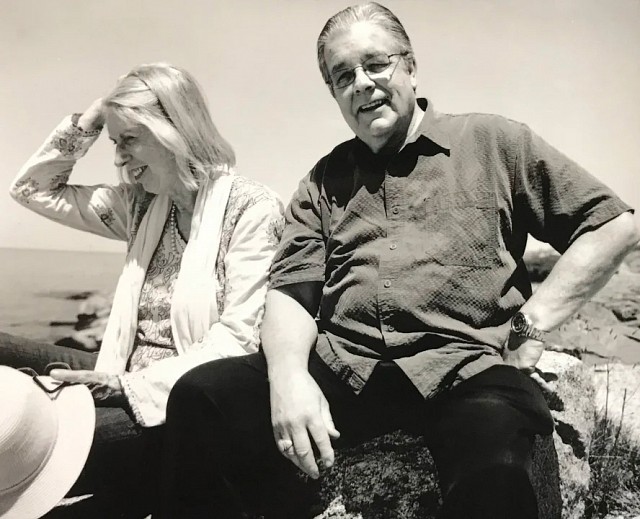
Remembering Roswell Angier | The School of the Museum of Fine Arts at TUFTS
June 16, 2023 - Bonnie Donohoe, Jim Dow, and Eulogio Guzmán
Roswell Angier (1940-2023) joined the School of the Museum of Fine Arts photography faculty in 1990 and chaired the photography program on Tufts University's Medford campus until his retirement in 2015. He was the only full-time faculty member teaching photography and theory related classes on the Medford campus. With vivid interest among Tufts students for more in-depth photography classes on campus, he expanded the department with perfectly calibrated part-time hires (Mike Mandel, Dory Gardner, and Tom McIntyre) who, as a well-oiled team, provided students with a broad and deep dive into photography as a practice.
Roswell was a self-taught practitioner in the art and craft of photography, which he mastered through focused practice and devotion to his profession as an artist. After completing his B.A. at Harvard University and his M.A. at UC Berkeley, majoring in English and Comparative Literature, he continued on as a doctoral candidate in Philosophy at UC Berkeley, but left academia for a creative life in the photographic arts. His philosophy background informed his photography, how he thought and talked about it, and influenced the text of his publications, his teaching, and his exquisite talent for sequencing images for gallery exhibitions or for books. Long term colleague and Tufts Emeriti Professor of the Practice in Photography Jim Dow said: "In so many ways his pictures are almost literary stills, not literal but evocative or, to quote Roswell speaking about a particular picture just before his passing (The Guardian, May 17, 2023), 'When an image is pin sharp, it is so much easier to forget. But here, the shadowy figure somehow enters your own mental space. He [the subject] becomes almost glued to your psyche.'"
Roswell was an old soul who exuded curiosity, wisdom, and all-around calmness as he photographed with a compassionate but unblinking eye. In a 2007 New Yorker review of Roswell’s exhibition at Gitterman Gallery, Vince Aletti described his “gritty” work as “clearly drawn to the dark end of the street.” He qualified this by saying there was “no sense of hit-and-run exploitation… just a mixture of tenderness, concern, and righteous anger.” This “tough love” description might also represent his approach to his students, many of whom remember his mentorship with fondness.
Roswell’s career as a photographer, portraitist, and professor was as engaging as his photographs. He was the editor of FUSION Magazine from 1968-1972, worked as a freelance magazine photographer with dozens of credits to his name, and documented Boston’s infamous Combat Zone adult entertainment district during its heyday, indelibly capturing the ephemeral existence of the laughter, struggles, solitude, and triumphs of its actors. His book A Kind of Life: Conversations in the Combat Zone (Addison House, 1976) reveals his practice as conversant with those he photographed. Photographs were inherently conversational for Roswell, meditative compositions, lectures as it were, on the beauty and richness of human engagement.
Roswell's book Train Your Gaze: A Practical and Theoretical Introduction to Portrait Photography (AVA Academia, 2007) provided essential lessons he learned through his years of practice to achieve ethically sound, yet aesthetically captivating images; it is a step-by-step course in portrait photography. Its multiple reprints bear testimony to Roswell’s ingenuity and success as an educator.
He taught in a recondite corner of the Jackson Gym, part of the behemoth sports complex on the Tufts campus. To access the lab, students walked past a gym, traversed a long dark hallway, and descended an emergency egress that landed them in the basement. There was the photography lab and Roswell's office, a place he lovingly referred to as the doghouse, where he was top dog embodying the best virtues of that kind being: unconditional devotion and alert attention. Students described his office as tiny, dark, stuffy, and smokey but, above all, homely. Students found him there with his slicked back hair, three-piece suits and, in later years, sporting a jazzy walking cane; above all, they found his warmth, gravelly sweet voice, razor sharp intellect, and socially conscious commentary at once disarming and relaxing. It is no surprise that he trained an impressive cadre of undergraduate, graduate, and combined degree students who made the labyrinthine pilgrimage to visit the master that made them all feel as special and comfortable as those viewed in Roswell’s portrait photographs.
Roswell had an exceptional gift for recording the humanity and dignity of the everyday people who literally worked in the shadows or lived in backrooms. Through his work, he brought joy, light, and reflection to our lives. His meditative portraits captured spirits -- sometimes old and tired and often vital and rambunctious -- in everyday life. Roswell’s photographic oeuvre reflects the long and deep view from his lens.
He was a beloved educator, revered colleague, loyal friend, and devoted companion and spouse to the painter Susan Hawley, affectionately known as Hollysue. He and Susan co-authored the just-released book Gallup (MIT Press, June 2023), which captures ephemeral portraits in the timeless, commonplace, rich, and at times awkward, existence of vernacular living away from the limelight. Roswell successfully persuaded us to train our gaze on the everyday and to encounter, think, and deeply engage with it, while his own work enriched our lives. We are thankful to Roswell for leaving a handsomely profound body of work amassed through his contemplative, learned, vocation as a frame for us to look closer and take careful notice of the deep arc of human experience.
Back to News
